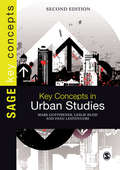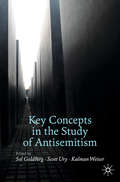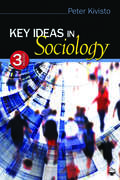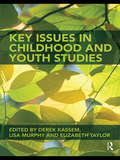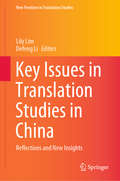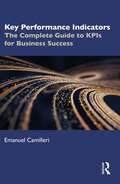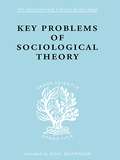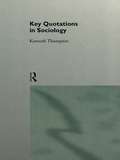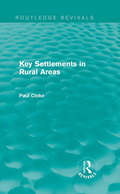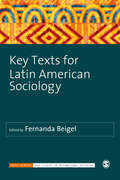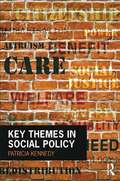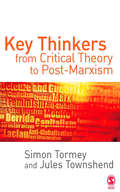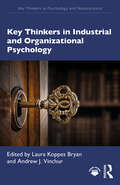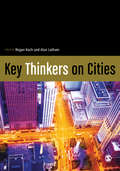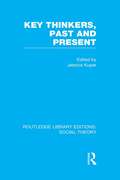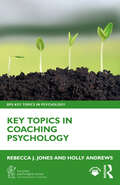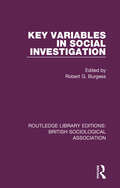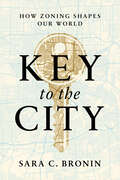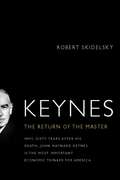- Table View
- List View
Key Concepts in Urban Studies (SAGE Key Concepts series)
by Mark Gottdiener Mr Leslie Budd Professor Panu Lehtovuori"Key Concepts in Urban Studies is written in an accessible, concise way and introduces students to the key topics in urban studies. Drawing examples from different parts of the world, this authoritative resource exposes students to the diverse forms that cities take, and the social, spatial and temporal dimensions of urban living. It is an essential resource for students across disciplines interested in the city." - Lily Kong, Singapore Management University "An insightful multidisciplinary introduction to the multifarious places, processes and problems that constitute modern cities. Its short, digestible entries unpack the complexity and evolution of urban conditions, offering cross-references between concepts and links to key literature and to useful current and historical examples. The book’s clear, often sharp critical edge also encourages deeper enquiry." - Quentin Stevens, School of Architecture and Design, RMIT University Key Concepts in Urban Studies is an essential companion for students of urban studies, urban sociology, urban politics, urban planning and urban development. This revised edition has been updated and expanded to provide a keen global focus, particularly in emerging economies with discussions on the creation of “dream cities” in the Gulf States and a renewed emphasis on building mega-scaled “downtowns” in India and China. New features include: Contemporary and international examples throughout. Detailed entries on environmental concerns and the sustainability of urban development. Discussion of the role of consumption in city culture and urban development. New entries on modern urban planning and adaptive urbanism. Key Concepts in Urban Studies is a must-have text with an explicit focus on contemporary urbanism which students will find invaluable during their studies. Mark Gottdiener is Professor Emeritus of Sociology at The University at Buffalo (SUNY). Leslie Budd is Reader in Social Science at the Open University. Panu Lehtovuori is Professor of Planning Theory at Tampere University of Technology.
Key Concepts in Urban Studies (SAGE Key Concepts series)
by Mark Gottdiener Mr Leslie Budd Professor Panu Lehtovuori"Key Concepts in Urban Studies is written in an accessible, concise way and introduces students to the key topics in urban studies. Drawing examples from different parts of the world, this authoritative resource exposes students to the diverse forms that cities take, and the social, spatial and temporal dimensions of urban living. It is an essential resource for students across disciplines interested in the city." - Lily Kong, Singapore Management University "An insightful multidisciplinary introduction to the multifarious places, processes and problems that constitute modern cities. Its short, digestible entries unpack the complexity and evolution of urban conditions, offering cross-references between concepts and links to key literature and to useful current and historical examples. The book's clear, often sharp critical edge also encourages deeper enquiry." - Quentin Stevens, School of Architecture and Design, RMIT University Key Concepts in Urban Studies is an essential companion for students of urban studies, urban sociology, urban politics, urban planning and urban development. This revised edition has been updated and expanded to provide a keen global focus, particularly in emerging economies with discussions on the creation of "dream cities" in the Gulf States and a renewed emphasis on building mega-scaled "downtowns" in India and China. New features include: Contemporary and international examples throughout. Detailed entries on environmental concerns and the sustainability of urban development. Discussion of the role of consumption in city culture and urban development. New entries on modern urban planning and adaptive urbanism. Key Concepts in Urban Studies is a must-have text with an explicit focus on contemporary urbanism which students will find invaluable during their studies. Mark Gottdiener is Professor Emeritus of Sociology at The University at Buffalo (SUNY). Leslie Budd is Reader in Social Science at the Open University. Panu Lehtovuori is Professor of Planning Theory at Tampere University of Technology.
Key Concepts in the Study of Antisemitism (Palgrave Critical Studies of Antisemitism and Racism)
by Scott Ury Kalman Weiser Sol GoldbergThis volume is designed to assist university faculty and students studying and teaching about antisemitism, racism, and other forms of prejudice. In contrast with similar volumes, it is organized around specific concepts instead of chronology or geography. It promotes conversation about antisemitism across disciplinary, geographic, and thematic lines rather than privileging a single methodological paradigm, a specific academic field, or an overarching narrative. Its twenty-one chapters by leading scholars in diverse fields address the relationship to antisemitism of concepts ranging from Anti-Judaism to Zionism. Each chapter not only traces the history and major scholarly debates around a key concept; it also presents an original argument, points to avenues for further research, and exemplifies a method of investigation.
Key Ideas in Sociology
by Peter KivistoKey Ideas in Sociology, Third Edition, is the only undergraduate text to link today's issues to the ideas and individuals of the era of classical sociological thought. Compact and affordable, this book provides an overview of how sociological theories have helped sociologists understand modern societies and human relations. It also describes the continual evolution of these theories in response to social change.Providing students with the opportunity to read from primary texts, this valuable supplement presents theories as interpretive tools, useful for understanding a multifaceted, ever-shifting social world. Emphasis is given to the working world, to the roles and responsibilities of citizenship, and to social relationships. A concluding chapter addresses globalization and its challenges.
Key Issues in Childhood and Youth Studies
by Elizabeth Taylor Lisa Murphy Derek KassemKey Issues in Childhood and Youth Studies presents an informed and critical commentary on a range of key issues related to children and childhood, from birth to eighteen years. Challenging current orthodoxies within the adult world on the nature of childhood, it is an essential text for students of childhood and youth studies as well as those studying relevant professional qualifications in social work, teaching and health. Exploring ideas from the historical development of childhood to the demonising of youth, it is divided into five clearly defined sections, each with their own editorial introduction which highlights the key themes. The sections focus on: the concept and creation of childhood child development ideas of risk, protection and childhood the politics of childhood international perspectives on childhood. This invaluable textbook provides an overview of childhood and youth studies and encourages students to think about the issues discussed and to develop their own ideas. Each chapter contains student activities, key concept boxes, recommended further reading and a reflection exercise.
Key Issues in Translation Studies in China: Reflections and New Insights (New Frontiers in Translation Studies)
by Defeng Li Lily LimThis book revisits a number of key issues in Chinese Translation Studies. Reflecting on e.g. what Translation Studies researchers have achieved in the past, and the extent to which the central issues have been addressed and what still needs to be done, a group of respected scholars share their expertise in order to identify some tangible directions and potential areas for future research. In addition, the book discusses a number of key themes, e.g. Translation Studies as a discipline and its essential characteristics, the cultural dimension in translator training, paradigms of curriculum design, the reform of assessment for professional qualification, acts and translation shifts, the principle of faithfulness in translation, and interpreter’s cognitive processing routes. The book offers a useful reference guide for a broad readership including graduate students, and shares insiders’ accounts of various current topics and issues in Chinese Translation Studies. Given its scope, it is also a valuable resource for researchers interested in translation studies in the Chinese context.
Key Performance Indicators: The Complete Guide to KPIs for Business Success
by Emanuel CamilleriKey performance indicators (KPIs) are widely used across organisations. But are they fully understood in how they can properly shape, improve, or even undermine organisational systems and outcomes? This book presents a framework and tools for measuring and managing performance at various levels within an organisation, and helps managers re-think the ways KPIs can be implemented to meet organisational goals.Innovative performance measurement and management is a vital function within any organisation irrespective of its size and industry. Measuring and managing performance (whether on an individual, team, or departmental basis) assists management in calibrating their established strategic goals by providing an insight into how well their employees and the organisation are doing and identifying areas of concern for rectification and improvement. This book focuses on the practicality of performance management tools (for example, Performance Analytics; Performance Reporting; Critical Success Factors; Balanced Scorecard; Benchmarking; Six Sigma; Business Excellence Models; Enterprise Risk Management) and illustrates their use, and the changing nature of how organisational performance will be evaluated in the future. This includes the application of Artificial Intelligence as an important trend in performance measurement and management.This book provides a universal framework for implementing a performance measurement and management system that is applicable to both the private and public sectors. It is particularly relevant to HR and operational managers, and organisational leaders and public administrators at all levels.
Key Problems of Sociological Theory (International Library of Sociology #Vol. 7)
by John RexFirst published in 2002. Routledge is an imprint of Taylor & Francis, an informa company.
Key Quotations in Sociology
by Ken Thompson Kenneth ThompsonFirst published in 1996. Routledge is an imprint of Taylor & Francis, an informa company.
Key Settlements in Rural Areas (Routledge Revivals)
by Paul ClokeThe problems of providing essential services in a constrained economic climate, and of conserving the rural environment whilst protecting rural people, are of immediate importance. This book, first published in 1979, was the first major piece of published research on the topic of rural settlement planning. It examines in detail the history and theory behind key settlement policies, and their practical application within the British rural planning system. Using Warwickshire and Devon as two very different case studies, Paul Cloke measures the outcome of settlement planning and discusses the wider implications of the ‘concentration-dispersal’ debate. This reissue will provide essential background for students of rural and social geography, and rural sociology and economics.
Key Texts for Latin American Sociology (SAGE Studies in International Sociology)
by Fernanda BeigelKey Texts for Latin American Sociology comprises translations of key texts from the Latin American Sociology canon. It is the first book to curate and then translate these key texts into English, bringing together texts from leading sociologists in Argentina, Brazil, Peru, Chile, Costa Rica, Mexico, Bolivia, and Uruguay, to provide comprehensive coverage of a wide range of issues in Latin American Sociology. By drawing attention to embedded issues such as development, inequalities, oppression and representation, the key texts approach sociology in its most authentic terms: as a means of understanding and committing to social change. The result of five years of collaboration between colleagues from 15 Latin American Countries, this volume was conceived at a workshop in Mendoza in 2013, where the scientific committee discussed the difference between “classics” and “key-texts” in Latin American sociology.
Key Texts for Latin American Sociology (SAGE Studies in International Sociology)
by Fernanda BeigelKey Texts for Latin American Sociology is the first book to curate and translate into English key texts from the Latin American Sociological canon. By bringing together texts from leading sociologists in Argentina, Brazil, Peru, Chile, Costa Rica, Mexico, Bolivia, and Uruguay, the book provides comprehensive coverage of a wide range of issues in Latin American Sociology; drawing attention to embedded issues such as inequalities, identities, development, oppression and representation. This volume is the result of five years of collaboration between colleagues from 15 Latin American Countries, coordinated by Fernanda Beigel (CONICET, UNCuyo, Mendoza-Argentina) with the collaboration of the ′Key Texts Scientific Committee′, the Committee consists of the following members: Nadya Araujo Guimaraes (PPGS-USP, Brazil), Manuel Antonio Garretón (Universidad de Chile), Raquel Sosa Elizaga (CELA-UNAM, México), Jorge Rovira Mas (Universidad de Costa Rica), Breno Bringel (IESP-UERJ, Brazil), Joao Ehlert Maia (FGV, Brazil), Hebe Vessuri (IVIC, Venezuela), André Bothelo (UFRJ, Brazil), Carlos Ruiz Encina (Universidad de Chile), Eloisa Martin (UFRJ, Brazil), Sergio Miceli (PPGS- USP, Brazil), Alejandro Moreano (UCE, Ecuador), Elizabeth Jelin (CONICET-IDES, Argentina), Patricia Funes (UBA-CONICET, Argentina), Claudio Pinheiro (FGV, Brazil), Pablo de Marinis (UBA, CONICET, Argentina), Diego Pereyra (UBA, CONICET, Argentina), José Gandarilla Salgado (CIICH-UNAM, México), Juan Piovani (UNLP-CONICET, Argentina).
Key Themes in Ancient History: Language and Society in the Greek and Roman Worlds
by James ClacksonTexts written in Latin, Greek and other languages provide ancient historians with their primary evidence, but the role of language as a source for understanding the ancient world is often overlooked. Language played a key role in state-formation and the spread of Christianity, the construction of ethnicity, and negotiating positions of social status and group membership. Language could reinforce social norms and shed light on taboos. This book presents an accessible account of ways in which linguistic evidence can illuminate topics such as imperialism, ethnicity, social mobility, religion, gender and sexuality in the ancient world, without assuming the reader has any knowledge of Greek or Latin, or of linguistic jargon. It describes the rise of Greek and Latin at the expense of other languages spoken around the Mediterranean and details the social meanings of different styles, and the attitudes of ancient speakers towards linguistic differences.
Key Themes in Ancient History: The Ancient City
by Arjan ZuiderhoekGreece and Rome were quintessentially urban societies. Ancient culture, politics and society arose and developed in the context of the polis and the civitas. In modern scholarship, the ancient city has been the subject of intense debates due to the strong association in Western thought between urbanism, capitalism and modernity. In this book, Arjan Zuiderhoek provides a survey of the main issues at stake in these debates, as well as a sketch of the chief characteristics of Greek and Roman cities. He argues that the ancient Greco-Roman city was indeed a highly specific form of urbanism, but that this does not imply that the ancient city was somehow 'superior' or 'inferior' to forms of urbanism in other societies, just (interestingly) different. The book is aimed primarily at students of ancient history and general readers, but also at scholars working on urbanism in other periods and places.
Key Themes in Social Policy
by Patricia KennedyKey Themes in Social Policy provides an accessible and authoritative introduction to the key concepts used in social policy, from autonomy to wellbeing. With over 100 ideas discussed, this is a comprehensive student guide and is designed to help readers to gain a deeper understanding of major debates and issues. Each entry: explains the origin of the word discusses its relationship to the social sciences describes its relevance to social policy and how widespread its use is outlines some of the key thinkers and research on the topic and gives suggestions for further reading. Making it easy to understand and use the most important ideas in the area, this is an essential companion for all students taking social policy courses.
Key Thinkers from Critical Theory to Post-Marxism (SAGE Politics Texts series)
by Dr Jules Townshend Dr Simon Tormey"Tormey and Townshend have succeeded not only in making accessible the notoriously evasive ideas of 'Post-Marxist' thinkers, they have begun the vital work of critically examining their contribution to Marx's project of overcoming capitalism." - James Martin, Goldsmiths, University of London "Excellent textbook - critical, challenging and thoroughly engaging!" - Richard White, Sheffield Hallam University "In language which is clear without being simplistic, Tormey and Townshend help readers think about ways to live 'with and without Marx' in the wake of Marxism's historical failures as well as its continuing relevance to life under globalizing capitalism." - Mark Rupert, Syracuse University Key Thinkers in Critical Theory to Post Marxism is a comprehensive introduction to perhaps the most key intellectual trend in contemporary critical theory. In jargon-free language, it seeks to unpack, explain and review many of the key figures behind the rethinking of the legacy of Marxism in theory and practice. Key thinkers covered include Cornelius Castoriadis, Jean-Francois Lyotard, Deleuze and Guattari, Laclau and Mouffe, Agnes Heller, Jacques Derrida, J rgen Habermas and post-Marxist feminism. Each chapter covers a key thinker or contribution and thus can be read as a stand alone introduction to the principal aspects of their approach. Each chapter is followed by a summary of key points with a guide to further reading. Underlying the text is also the central question: What is Post-Marxism? Instead of viewing Post-Marxism as an ideology, movement or tradition of theorizing, the authors advocate Post-Marxism as a loose appellation describing those who have problematised Marx's approach to understanding and challenging contemporary capitalism. As such the book also offers an engaging commentary on some of the key political developments of our time including, for example, the anti-globalisation movement. Key Thinkers in Critical Theory to Post Marxism provides an ideal introduction to a hitherto complex subject and will be essential reading for students of contemporary social and political inquiry.
Key Thinkers in Industrial and Organizational Psychology (Key Thinkers in Psychology and Neuroscience)
by Andrew J. Vinchur Laura Koppes BryanKey Thinkers in Industrial and Organizational Psychology explores the lives, ideas, contributions, and impact of key figures who have shaped and developed industrial and organizational (I-O) psychology.Through a chronological lens, the book traces the history and context behind the groundbreaking work of a diverse group of individuals who have influenced the field. Among those featured are pioneers such as Walter Dill Scott, Charles S. Myers, Lillian Evelyn Moller Gilbreth, Francizka Baumgarten-Tramer, Chen Li, and Bernard M. Bass. The book offers the reader a comprehensive understanding of the evolving ideas and discoveries that have shaped I-O research and practice over time.This book is an invaluable resource for all scientists and practitioners of I-O psychology and historians of psychology, as well as anyone interested in how psychology has transformed workplaces and influenced organizational practices.
Key Thinkers on Cities
by Alan Latham Regan KochKey Thinkers on Cities provides an engaging introduction to the dynamic intellectual field of urban studies. It profiles the work of 40 innovative thinkers who represent the broad reach of contemporary urban scholarship and whose ideas have shaped the way cities around the world are understood, researched, debated and acted upon. Providing a synoptic overview that spans a wide range of academic and professional disciplines, theoretical perspectives and methodological approaches, the entry for each key thinker comprises: A succinct introduction and overview Intellectual biography and research focus An explication of key ideas Contributions to urban studies The book offers a fresh look at well-known thinkers who have been foundational to urban scholarship, including Jane Jacobs, Henri Lefebvre, Manuel Castells and David Harvey. It also incorporates those who have helped to bring a concern for cities to more widespread audiences, such as Jan Gehl, Mike Davis and Enrique Peñalosa. Notably, the book also includes a range of thinkers who have more recently begun to shape the study of cities through engagements with art, architecture, computer modelling, ethnography, public health, post-colonial theory and more. With an introduction that provides a mapping of the current transdisciplinary field, and individual entries by those currently involved in cutting edge urban research in the Global North and South, this book promises to be an essential text for anyone interested in the study of cities and urban life. It will be of use to those in the fields of anthropology, economics, geography, sociology and urban planning.
Key Thinkers, Past and Present (Routledge Library Editions: Social Theory)
by Jessica KuperThis volume provides a fascinating perspective on the social sciences through its examination of the leading proponents, their ideas and careers. It includes useful suggestions for further reading. All the great names in the history of the subject are here – Freud, Marx, Weber, Adam Smith and so on – along with many less prominent but nevertheless important thinkers.
Key Topics in Coaching Psychology (BPS Key Topics in Psychology)
by Holly Andrews Rebecca J. JonesOffering a concise and easy-to-read introduction to the subject, this book deals with key topics in the study of coaching psychology. It explains what coaching psychology is, when and why it is used, and what research can tell us about how and why it works.The book opens with an exploration of the key foundations of coaching psychology, including how it is defined, where it began, and how has it developed. This is followed by an overview of the key theories informing coaching psychology: person-centred theories, goal-setting theory, adult learning theory, and the main theoretical approaches to coaching (behavioural coaching, cognitive behavioural coaching, psychodynamic coaching, and systemic coaching). The authors discuss the key methodologies used in coaching psychology research, covering both quantitative and qualitative approaches, before exploring the impact of coaching psychology on five areas of practice: coaching in the workplace, career coaching, coaching in education, life coaching, and health coaching. Finally, they suggest future directions for the field by examining emerging areas in research and practice.Academically informed, and fully integrating key theories with application in coaching practice, this book gives readers a comprehensive yet accessible understanding of coaching psychology. Key Topics in Coaching Psychology is the ideal resource for undergraduate and postgraduate students of coaching psychology and occupational psychology, business, and leadership, as well as anyone with an interest in learning more about coaching psychology.
Key Topics in Sociolinguistics: Language Maintenance and Shift
by Anne PauwelsWhat motivates some linguistic minorities to maintain their language? Why do others shift away from it rather quickly? Are there specific conditions - environmental or personal - influencing these dynamics? What can families and communities do to pass on their 'threatened' language to the next generation? These and related questions are investigated in detail in Language Maintenance and Shift. In this fascinating book, Anne Pauwels analyses the patterns of language use exhibited by individuals and groups living in multilingual societies, and explores their efforts to maintain their heritage or minority language. She explores the various methods used to analyse language maintenance, from linguistic demography to linguistic biography, and offers guidance on how to research the language patterns and practices of linguistic minorities around the world.
Key Topics in Sociology: The Political Sociology of Human Rights
by Kate NashThe language of human rights is the most prominent 'people-centred' language of global justice today. This textbook looks at how human rights are constructed at local, national, international and transnational levels and considers commonalities and differences around the world. Through discussions of key debates in the interdisciplinary study of human rights, the book develops its themes by considering examples of human rights advocacy in international organisations, national states and local grassroots movements. Case studies relating to specific organisations and institutions illustrate how human rights are being used to address structural injustices: imperialist geopolitics, authoritarianism and corruption, inequalities created by 'freeing' markets, dangers faced by transnational migrants as a result of the securitization of borders, and violence against women.
Key Variables in Social Investigation (Routledge Library Editions: British Sociological Association #4)
by Robert G. BurgessKey Variables in Social Investigation encourages sociologists and other social scientists to think about the conceptual and empirical problems of using and evaluating key variables in social research. The book contains reviews of ten major variables: age; gender; race and ethnicity; health and illness; education; social class and occupation; work, employment and unemployment and unemployment; leisure; politics; and voluntary ways in which concepts can be specified and translated into variables and indicators.
Key to the City: How Zoning Shapes Our World
by Sara C. BroninAn eye-opening exploration of one of the little-known levers that controls our world—zoning codes—and a call-to-arms for using them to improve American society at every level. Zoning codes dictate how and where we can build housing, factories, restaurants, and parks. They limit how tall buildings can be and where trees can be planted. They have become the most significant regulatory power of local government, ultimately determining how we experience our cities. Yet zoning remains invisible. In Key to the City, legal scholar and architect Sara C. Bronin examines how zoning became such a prevailing force and reveals its impact—and its potential for good. Outdated zoning codes have maintained racial segregation, prioritized cars over people, and enabled great ecological harm. But, as Bronin argues, once we recognize the power of zoning, we can harness it to create the communities we desire, and deserve. Drawing on her own experience leading the overhaul of Hartford’s zoning code and exploring the efforts of activists and city planners across the country, Bronin shows how new codes are reshaping our cities—from Baltimore to Chicago, Las Vegas to Minneapolis, and beyond. In Boston, a law fought for by a passionate group of organizers, farmers, and beekeepers is transforming the city into a haven for urban farming. In Tucson, zoning codes are mitigating the impacts of climate change and drought-proofing neighborhoods in peril. In Delray Beach, Florida, a new code aims to capture and maintain the town’s colorful spirit through its architecture. With clarity and insight, Bronin demystifies the power of an inscrutable organizing force in our lives and invites us to see zoning as a revolutionary vehicle for change. In Key to the City, she puts forward a practical and energizing vision for how we can reimagine our communities.
Keynes
by Robert SkidelskyThe ideas of John Maynard Keynes have never been more timely. No one has bettered Keynes's description of the psychology of investors during a financial crisis: OCyThe practice of calmness and immobility, of certainty and security, suddenly breaks down. New fears and hopes will, without warning, take charge of human conductOC the market will be subject to waves of optimistic and pessimistic sentiment. ' Keynes's preeminent biographer, Robert Skidelsky, Emeritus Professor of Political Economy at the University of Warwick, brilliantly synthesizes from Keynes's career and life the aspects of his thinking that apply most directly to the world we currently live in. In so doing, Skidelsky shows that Keynes's mixture of pragmatism and realism OCo which distinguished his thinking from the neo-classical or Chicago school of economics that has been the dominant influence since the Thatcher-Reagan era and which made possible the raw market capitalism that created the current global financial crisis OCo is more pertinent and applicable than ever. Crucially Keynes offers nervous capitalists OCo and Keynes never wavered in his belief in the capitalist system OCo a positive answer to the question we now face: When unbridled capitalism falters, is there an alternative? In the long run, as Keynes famously said, we are all dead. We may not have time to wait for the perfect theoretical operation of capital as the neo-classicists insist will happen eventually. In the meantime, we have Keynes: more supple, more human and more magnificently real than ever.
